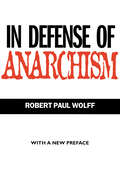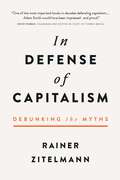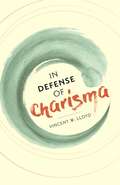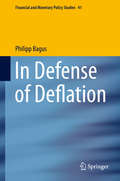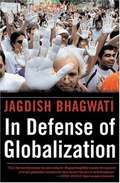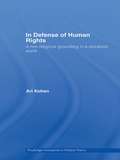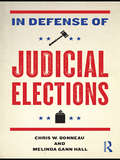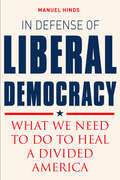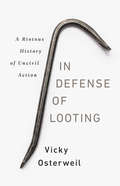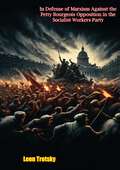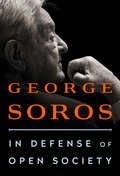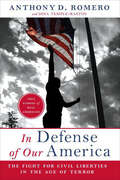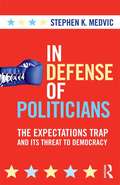- Table View
- List View
In Defense of Anarchism
by Robert P. WolffOnce more available in paperback, and with a new Preface, here is Robert Paul Wolff's classic 1970 analysis of the foundations of the authority of the state and the problems of political authority and moral autonomy in a democracy.
In Defense of Anarchism
by Robert Paul WolffIn Defense of Anarchism is a 1970 book by the philosopher Robert Paul Wolff, in which the author defends individualist anarchism. He argues that individual autonomy and state authority are mutually exclusive and that, as individual autonomy is inalienable, the moral legitimacy of the state collapses.
In Defense of Andrew Jackson
by Bradley Birzer“I’m not an Andrew Jackson fan, but I’m definitely a Bradley Birzer fan. His case for Old Hickory is as strong as any I’ve seen and deserves to be reckoned with.”- THOMAS E. WOODS JR., author of The Politically Incorrect Guide to American History. “Most discussion of Andrew Jackson falls into predictable ruts, defaulting automatically to clichés that reflect more on our own time than his. Whether America is entering another ‘Jacksonian’ period depends upon understanding the first one more clearly, and we have Bradley Birzer to thank for taking up a spirited defense of this complicated man and his legacy.” - STEVEN F. HAYWARD, author of The Age of Reagan: The Conservative Counterrevolution 1980-1989. “Liberal revisionists have pounded Andrew Jackson down to the point where Democrats are ashamed to admit he founded their party. In Defense of Andrew Jackson sets the record straight on America’s first populist president.” - JAMES S. ROBBINS, author of Erasing America: Losing Our Future by Destroying Our Past. “As a man and a military hero, Andrew Jackson is as American as they come. But in this timely biography, Bradley Birzer has managed to peel back layers of cliché and reveal our seventh president as a more complex human being than current textbooks allow.” - GLEAVES WHITNEY, director of Grand Valley State University’s Hauenstein Center for Presidential Studies. "He was a man of the frontier, self-made but appreciative of those who gave him their loyalty and support. He was, pure and simple, and American..." He was controversial in his time—and even more controversial in our own. Indian fighter, ardent patriot, hero of the War of 1812, the very embodiment of America’s democratic and frontier spirit, Andrew Jackson was an iconic figure. Today, Jackson is criticized and reviled – condemned as a slave-owner, repudiated as the president who dispatched the Indians down the “Trail of Tears,” dropped with embarrassment by the Democratic Party, and demanded by many to be removed from the twenty-dollar bill. Who is the real Andrew Jackson? The beloved Old Hickory whom Americans once revered? Or the villain who has become a prime target of the Social Justice Warriors? Using letters, diaries, newspaper columns, and notes, historian Bradley Birzer provides a fresh and enlightening perspective on Jackson —unvarnished, true to history, revealing why President Donald Trump sees Andrew Jackson as a political role model, and illustrating the strong parallels between the anxieties of Jacksonian America and the anxieties of the "Hillbilly Elegy" voting bloc of today. In this brilliant new book, Bradley Birzer makes the case that Jackson was… The epitome of the American frontier republican. Passionately devoted to individual liberty. A staunch proponent of Christian morality. Not only dedicated but also vital to the preservation of the Union. A significant and influential role model to President Donald J. Trump. In Defense of Andrew Jackson sets the record straight on our seventh president, revealing a radically new but historically accurate perspective on Jackson.
In Defense of Capitalism: Debunking the Myths
by Rainer ZitelmannCapitalism, its critics say, prioritizes profits over humanity, creates dominant monopolies, and undermines democracy. Zitelmann scrutinizes each of these arguments in turn and reveals the critical flaws that debunk them.Rainer Zitelmann examines the ten most common objections to capitalism: that capitalism leads to hunger and poverty, to rising inequality, to unnecessary consumption, to environmental destruction, to climate change and wars. Capitalism, its critics say, prioritizes profits over humanity, creates dominant monopolies, and undermines democracy. Zitelmann scrutinizes each of these arguments in turn and reveals the critical flaws that debunk them. He offers counter arguments to each charge, deploying a wealth of historical evidence and eye-opening facts to prove that it is not capitalism that has failed, but a century of anti-capitalist experiments.
In Defense of Charisma
by Vincent W. LloydMartin Luther King, Jr., has charisma—as does Adolf Hitler. So do Brad Pitt, Mother Teresa, and many a high school teacher. Charisma marks, or masks, power; it legitimates but also attracts suspicion. Sociologists often view charisma as an irrational, unstable source of authority, superseded by the rational, bureaucratic legitimacy of modernity. Yet charisma endures in the modern world; perhaps it is reinvigorated in the postmodern, as the notoriety of celebrities, politicians, and New Age gurus attests. Is charisma a tool of oppression, or can it help the fight against oppression? Can reexamining the concept of charisma teach us anything useful about contemporary movements for social justice?In Defense of Charisma develops an account of moral charisma that weaves insights from politics, ethics, and religion together with reflections on contemporary culture. Vincent W. Lloyd distinguishes between authoritarian charisma, which furthers the interests of the powerful, naturalizing racism, patriarchy, and elitism, and democratic charisma, which prompts observers to ask new questions and discover new possibilities. At its best, charisma can challenge the way we see ourselves and our world, priming us to struggle for justice. Exploring the biblical Moses alongside Charlton Heston’s performance in The Ten Commandments, the image of Martin Luther King, Jr., together with tweets from the Black Lives Matter movement, and the novels of Harper Lee and Sherman Alexie juxtaposed with the writings of Emmanuel Levinas, In Defense of Charisma challenges readers to turn away from the blinding charisma of celebrities toward the humbler moral charisma of the neighbor, colleague, or relative.
In Defense of Decadent Europe
by Raymond AronRaymond Aron's In Defense of Decadent Europe was first conceived at a time of great uncertainty for the Western democracies. The postwar economic boom had been interrupted by "stagflation," while communist and socialist parties in Italy and France were powerful factors in Europe's political landscape. Aron's book has a threefold purpose: the analysis of the Soviet Russian regime and its Marxist-Leninist theoretical foundation; the detailed empirical comparison between liberal democracies and collectivist regimes of the East; and, above all, the exploration of what might be termed the "problem" of democracy the tendency of democratic regimes to undermine themselves unless checked in their most extreme tendencies.Aron denounces the clash between democracy and the Marxist-Leninist mystification and explains how Marxism leads to Soviet-style ideology. The second part of the book constitutes a defense of liberal Europe. The author makes comparisons in terms of productivity, technical innovation, living standards, scientific progress, and human freedom. But Aron also notes there are important ways in which the West must put her house in order by cultivating authority in the church, in universities, in business, and even in the army. This paradox is conveyed by the title of the book, the juxtaposition of the words In Defense of and Decadent Europe.In the new introduction, Daniel Mahoney and Brian Anderson discuss the disenchanted conservative liberalism of Raymond Aron that set him apart. Among the topics they cover are: the challenge of ideocracy, the decadence of democracy, and Aron as a civic philosopher. In Defense of Decadent Europe combines ideological debate with economic and social analysis. Its thorough examination of Western freedom versus the Eastern communism of the recent past extends well beyond parochial debates into a basic vision of Western societies. The book will be compelling for historians, political scientists, economists, and philosophers.
In Defense of Deflation
by Philipp BagusThis book analyses the causes and consequences of deflation. In contrast to the widespread belief that deflation would be harmful to the economy as a whole, the author argues that free market deflation is liberating and beneficial. Several myths of deflation are exposed and the reasons for the widespread deflation phobia that serves to justify expansionary monetary policy, i. e. , inflation are investigated. Two historical case studies, the growth deflation in the US after the Civil War and the bank credit deflation in Germany during the Great Depression are discussed to illustrate the points made in the theoretical analysis of deflation.
In Defense of German Colonialism: And How Its Critics Empowered Nazis, Communists, and the Enemies of the West
by Bruce GilleyFamed historian and author of the groundbreaking "The Case for Colonialism" demonstrates that, contary to modern presuppositions, German colonialism from its early roots to the mid-twentieth century was overall a force for good in the world where development was encouraged and native governance flourished.Historian and university professor, Bruce Gilley, delves into the history of German colonialism from its earliest roots through the 20th century, demonstrating that contrary to modern presuppositions, it served as a global force for good—elevating the lives of its subjects and encouraging scientific development while allowing native cultures to flourish within its governance.
In Defense of Globalization
by Jagdish BhagwatiPassionate defense of economic and social aspects of globalization.
In Defense of Housing: The Politics of Crisis
by David Madden Peter MarcuseIn every major city in the world there is a housing crisis. How did this happen and what can we do about it?Everyone needs and deserves housing. But today our homes are being transformed into commodities, making the inequalities of the city ever more acute. Profit has become more important than social need. The poor are forced to pay more for worse housing. Communities are faced with the violence of displacement and gentrification. And the benefits of decent housing are only available for those who can afford it.In Defense of Housing is the definitive statement on this crisis from leading urban planner Peter Marcuse and sociologist David Madden. They look at the causes and consequences of the housing problem and detail the need for progressive alternatives. The housing crisis cannot be solved by minor policy shifts, they argue. Rather, the housing crisis has deep political and economic roots—and therefore requires a radical response.
In Defense of Human Rights: A Non-Religious Grounding in a Pluralistic World (Routledge Innovations in Political Theory #Vol. 25)
by Ari KohenThe argument that religion provides the only compelling foundation for human rights is both challenging and thought-provoking and answering it is of fundamental importance to the furthering of the human rights agenda. This book establishes an equally compelling non-religious foundation for the idea of human rights, engaging with the writings of many key thinkers in the field, including Michael J. Perry, Alan Gewirth, Ronald Dworkin and Richard Rorty. Ari Kohen draws on the Universal Declaration of Human Rights as a political consensus of overlapping ideas from cultures and communities around the world that establishes the dignity of humans and argues that this dignity gives rise to collective human rights. In constructing this consensus, we have succeeded in establishing a practical non-religious foundation upon which the idea of human rights can rest. In Defense of Human Rights will be of interest to students and scholars of political theory, philosophy, religious studies and human rights.
In Defense of Hypocrisy: Picking Sides in the War on Virtue
by Jeremy Lott"With verve, gusto, and just the right amount of humility, Jeremy Lott argues that hypocrisy isn't as bad as advertised, and that the critics of hypocrisy are often hypocritical themselves. A perfect read and a necessary corrective for this political season." --Glenn Reynolds, Instapundit.com "Lott argues convincingly that acts of hypocrisy can be embraced, not dismissed. In this highly-readable book, he makes the counterintuitive suggestion that hypocrisy is a natural element of the human condition." --David Mark, author, Going Dirty: The Art of Negative Campaigning "The popular usage of the term 'hypocrite' is expansive like a shotgun blast, and is often brought in to describe someone we don't like, doing something that we disagree with, involving some sort of perceived contradiction." It's an old familiar routine. Dick accuses Jane of rank hypocrisy, while ignoring his own moral inconsistencies. Jane is outraged by the charge, and fires right back. And author Jeremy Lott? Well he's blowing a wet raspberry at the whole ridiculous spectacle. In Defense of Hypocrisy deconstructs pat prejudices and shallow moralism to probe hypocrisy's real significance, asking: Why there is so much hypocrisy, and so much hatred of it? Why do we behave so inconsistently but then denounce those traits in others? Why are people so often fooled by hypocrites? What if hypocrisy is more than just a necessary evil? In fact, what if hypocrisy is also an engine of moral progress? In Defense of Hypocrisy is part political, part religious, part philosophical, and all honesty. Though the word has long since reached epithet status, Lott beckons the reader to see the real virtue-impoverished agendas behind the accusations and embrace a sturdier, more realistic understanding of a much-maligned vice. The charges have been brought, the jury bought, and the judge clears his throat to hand down the expected judgment: "Hypocrisy is a most damnable offense. . . " "Not so fast," says Jeremy Lott. "I object!" In Defense of Hypocrisy is the case for a mistrial-a thought-provoking, wit-filled, morally-charged, rollicking justification of good people who behave badly. Lott tackles the alleged two-facedness of popular targets from Bill Bennett to Dick Morris to Britney Spears. Far from focusing merely on politics, Lott looks at philosophy, history, theology, and pop culture to give the hypocrites their due. This gutsy exposé of the corrosive uses of hypocrisy accusations will challenge you to open your mind, hang the jury, and decide for yourself: Is hypocrisy really so bad?
In Defense of Ideology: Reexamining the Role of Ideology in the American Electorate (Elements in Political Psychology)
by Elizabeth N. SimasYears of collective political science research has fueled the stereotype of the uninformed or illogical American voter who ardently supports parties or candidates but lacks any cohesive ideological reasons for doing so. Prior works, however, do not tell the whole story nor fully capture the nature of public opinion in today's increasingly polarized political environment. Thus, this Element makes the case for more careful and nuanced assessments of ideological thinking in the American electorate. Using a variety of more contemporary survey and experimental data, it shows that a substantial portion of Americans do hold coherent political beliefs and that these beliefs have important consequences for the American political system. Though partisanship still plays a powerful role, the electorate as this Element presents it is much more ideological than the literature too often assumes.
In Defense of Japan: From the Market to the Military in Space Policy
by Saadia M. Pekkanen Paul Kallender-UmezuIn Defense of Japan provides the first complete, up-to-date, English-language account of the history, politics, and policy of Japan's strategic space development. The dual-use nature of space technologies, meaning that they cut across both market and military applications, has had two important consequences for Japan. First, Japan has developed space technologies for the market in its civilian space program that have yet to be commercially competitive. Second, faced with rising geopolitical uncertainties and in the interest of their own economics, the makers of such technologies have been critical players in the shift from the market to the military in Japan's space capabilities and policy. This book shows how the sum total of market-to-military moves across space launch vehicles, satellites and spacecraft, and emerging related technologies, already mark Japan as an advanced military space power.
In Defense of Judicial Elections (Controversies in Electoral Democracy and Representation)
by Melinda Gann Hall Chris W. BonneauOne of the most contentious issues in politics today is the propriety of electing judges. Ought judges be independent of democratic processes in obtaining and retaining their seats, or should they be subject to the approval of the electorate and the processes that accompany popular control? While this debate is interesting and often quite heated, it usually occurs without reference to empirical facts--or at least accurate ones. Also, empirical scholars to date have refused to take a position on the normative issues surrounding the practice. Bonneau and Hall offer a fresh new approach. Using almost two decades of data on state supreme court elections, Bonneau and Hall argue that opponents of judicial elections have made—and continue to make—erroneous empirical claims. They show that judicial elections are efficacious mechanisms that enhance the quality of democracy and create an inextricable link between citizens and the judiciary. In so doing, they pioneer the use of empirical data to shed light on these normative questions and offer a coherent defense of judicial elections. This provocative book is essential reading for anyone interested in the politics of judicial selection, law and politics, or the electoral process. Part of the Controversies in Electoral Democracy and Representation series edited by Matthew J. Streb.
In Defense of Liberal Democracy: What We Need to Do to Heal a Divided America
by Manuel HindsIn Defense of Liberal Democracy is a clarion call for today's divided time: a bold reaffirmation of the liberal democratic principles that have carried America through each crisis in its history--and can do so again.Merging expert historical, political, and economic analysis, In Defense of Liberal Democracy shows how our recent technological revolution--what high-profile economist Manuel Hinds calls the Connectivity Revolution--has led to a crisis of divisiveness. Assessing the angry rhetoric and polarization of current political and social discourse in the US, Hinds considers the dangers of seeking populist solutions to our current upheaval and shows how the traditions and institutions of liberal democracy restored prosperity, freedom, and social equity during the Industrial Revolution, the Great Depression, and other periods of political instability. Hinds examines our national past and present (up to and including the 2020 presidential election) to illustrate how current events can be as dramatic as any historical legacy in warning us of the danger of abandoning our democratic principles.
In Defense of Looting: A Riotous History of Uncivil Action
by Vicky OsterweilA fresh argument for rioting and looting as our most powerful tools for dismantling white supremacyLooting--a crowd of people publicly, openly, and directly seizing goods--is one of the more extreme actions that can take place in the midst of social unrest. Even self-identified radicals distance themselves from looters, fearing that violent tactics reflect badly on the broader movement.But Vicky Osterweil argues that stealing goods and destroying property are direct, pragmatic strategies of wealth redistribution and improving life for the working class--not to mention the brazen messages these methods send to the police and the state. All our beliefs about the innate righteousness of property and ownership, Osterweil explains, are built on the history of anti-Black, anti-Indigenous oppression.From slave revolts to labor strikes to the modern-day movements for climate change, Black lives, and police abolition, Osterweil makes a convincing case for rioting and looting as weapons that bludgeon the status quo while uplifting the poor and marginalized. In Defense of Looting is a history of violent protest sparking social change, a compelling reframing of revolutionary activism, and a practical vision for a dramatically restructured society.
In Defense of Lost Causes
by Slavoj ZizekIn this combative major new work, philosophical sharpshooter Slavoj i ek looks for the kernel of truth in the totalitarian politics of the past.Examining Heidegger's seduction by fascism and Foucault's flirtation with the Iranian Revolution, he suggests that these were the 'right steps in the wrong direction.' On the revolutionary terror of Robespierre, Mao and the bolsheviks, i ek argues that while these struggles ended in historic failure and horror, there was a valuable core of idealism lost beneath the bloodshed.A redemptive vision has been obscured by the soft, decentralized politics of the liberal-democratic consensus. Faced with the coming ecological crisis, i ekk argues the case for revolutionary terror and the dictatorship of the proletariat. A return to past ideals is needed despite the risks. In the words of Samuel Beckett: 'Try again. Fail again. Fail better.'
In Defense of Marxism Against the Petty Bourgeois Opposition in the Socialist Workers Party [Original 1942 edition]
by Leon Trotsky James BurnhamThis seminal work by Leon Trotsky that captures the fierce ideological battles within the Socialist Workers Party (SWP) in the late 1930s and early 1940s. Written by one of the foremost leaders of the Russian Revolution and a key figure in the development of Marxist theory, this book is an impassioned defense of Marxist principles against what Trotsky perceived as deviations and betrayals within the party.Trotsky's work is a response to the internal conflicts that arose within the SWP, particularly focusing on the opposition led by James Burnham and Max Shachtman. He critiques their positions, which he argues represent a petty-bourgeois deviation from orthodox Marxism. Through a series of essays and letters, Trotsky systematically dismantles their arguments, defending the necessity of a disciplined, proletarian-led revolutionary party committed to Marxist doctrine.The book delves into key issues such as the nature of the Soviet Union, the role of the party, and the dangers of bureaucratic and reformist tendencies. Trotsky argues for the importance of maintaining a clear and unwavering commitment to Marxist principles in the face of internal and external pressures."In Defense of Marxism" is not just a historical document; it is a powerful exposition of Trotsky's vision of socialism and his critique of those who he believed were undermining the revolutionary cause. His writing is marked by clarity, passion, and a profound understanding of the dynamics of revolutionary struggle.This work is essential reading for anyone interested in Marxist theory, the history of the socialist movement, and the internal dynamics of revolutionary parties. Trotsky's "In Defense of Marxism" offers valuable insights into the challenges of maintaining ideological purity and unity within a revolutionary movement, making it a timeless contribution to socialist literature.
In Defense of Negativity: Attack Ads in Presidential Campaigns (Studies In Communication, Media, And Pub Ser.)
by John G. GeerAmericans tend to see negative campaign ads as just that: negative. Pundits, journalists, voters, and scholars frequently complain that such ads undermine elections and even democratic government itself. But John G. Geer here takes the opposite stance, arguing that when political candidates attack each other, raising doubts about each other’s views and qualifications, voters—and the democratic process—benefit. In Defense of Negativity, Geer’s study of negative advertising in presidential campaigns from 1960 to 2004, asserts that the proliferating attack ads are far more likely than positive ads to focus on salient political issues, rather than politicians’ personal characteristics. Accordingly, the ads enrich the democratic process, providing voters with relevant and substantial information before they head to the polls. An important and timely contribution to American political discourse, In Defense of Negativity concludes that if we want campaigns to grapple with relevant issues and address real problems, negative ads just might be the solution.
In Defense of Open Society
by George SorosAn impassioned defense of open society, academic and media freedom, and human rights.George Soros -- universally known for his philanthropy, progressive politics, and investment success--has been under sustained attack from the far right, nationalists, and anti-Semites in the United States and around the world because of his commitment to open society and liberal democracy.In this brilliant and spirited book, Soros brings together a vital collection of his writings, some never previously published. They deal with a wide range of important and timely topics: the dangers that the instruments of control produced by artificial intelligence and machine learning pose to open societies; what Soros calls his "political philanthropy"; his founding of the Central European University, one of the world's foremost defender of academic freedom; his philosophy; his boom/bust theory of financial markets and its policy implications; and what he calls the tragedy of the European Union. Soros's forceful affirmation of freedom, democracy, the rule of law, human rights, social justice, and social responsibility as a universal idea is a clarion call-to-arms for the ideals of open society.
In Defense of Our America: The Fight for Civil Liberties in the Age of Terror
by Dina Temple-Raston Anthony D. Romero“A brave, powerful book from one of freedom’s most courageous defenders. These stories remind us how real -- how personal -- the threats to our Constitutional rights really are -- and of the duty that we all have to protect them in times of trouble. Woven through these riveting chapters is a strong reminder: democracy is the best security.” — Eli Pariser, Founder and Executive Director, MOVEON.ORGExecutive Director of the ACLU Anthony D. Romero and award-winning journalist Dina Temple-Raston present stories of real Americans at the front lines of the fight for civil liberties at a time when our most basic rights are being challenged. From the story of "American Taliban" John Walker Lindh to the battle against the National Security Agency's warrantless spying program, and from a movement in Pennsylvania to force religion into the public school science curriculum to the case of Matthew Limon, a gay teenager sentenced to seventeen years in prison for having consensual oral sex with another teenage boy in Kansas, In Defense of Our America offers readers an eye-opening look at the dangerous erosion of rights in the post-9/11 age of terror and chronicles the courageous ongoing struggle of ordinary Americans to preserve our hard-won constitutional freedoms.
In Defense of Pluralism: Policy Disagreement and its Media Coverage (Cambridge Studies in Comparative Public Policy)
by Éric MontpetitThe work of early pluralist thinkers, from Arthur Bentley to Robert Dahl, inspired much optimism about democracy. They argued that democracy was functioning well, despite disagreements arising among the diversity of interests represented in policy-making processes. Yet it is unlikely that anyone paying attention to news coverage today would share such optimism. The media portray current policy-making processes as intractably polarized, devoid of any opportunity to move forward and adopt essential policy changes. This book aims to revive our long-lost sense of optimism about policy-making and democracy. Through original research into biotechnology policy-making in North America and Europe, Éric Montpetit shows that the depiction of policy-making offered by early pluralist thinkers is not so far off the present reality. Today's policy decision-making process - complete with disagreement among the participants - is consistent with what might be expected in a pluralist society, in sharp contrast with the negative image projected by the media. Offers an original perspective on policy-making that takes a clear normative stand. Reveals the importance of journalism and the media in influencing policy-making and public perceptions. Provides sophisticated yet accessible quantitative analyses of policy-making.
In Defense of Polemics (Argumentation Library #42)
by Ruth AmossyThis book revisits the definition of polemical discourse and deals with its functions in the democratic sphere. It first examines theoretical questions concerning the management of disagreement in democracy and the nature of polemical discourse. Next, it analyses case studies involving such issues as the place of women in the public space, illustrated by the case of the burqa in France and public controversy in the media on the exclusion of women from the public space. The book then explores reason, passion and violence in polemical discourse by means of cases involving confrontations between secular and ultra-orthodox circles, controversies about the Mexican Wall and fierce discussions about stock-options, and bonuses in times of financial crisis.Although polemical exchanges in the public sphere exacerbate dissent instead of resolving conflicts, they are quite frequent in the media and on the Net. How can we explain such a paradox? Most studies in argumentation avoid the question: they mainly focus on the verbal procedures leading to agreement. This focus stems from the centrality conferred upon consensus in our democratic societies, where decisions should be the result of a process of deliberation. What is then the social function of a confrontational management of dissent that does not primarily seek to achieve agreement? Is it just a sign of decadence, failure and powerlessness, or does it play a constructive role? This book answers these questions.
In Defense of Politicians: The Expectations Trap and Its Threat to Democracy (Controversies in Electoral Democracy and Representation)
by Stephen K. MedvicPoliticians are reviled. From jokes on late-night TV talk shows to radio show rants and from public opinion polls to ubiquitous conventional wisdom--politicians are among the most despised professional class in modern society. Drawing on seminal work in political science, Stephen K. Medvic convincingly argues to the masses that this blanket condemnation of politicians is both unfair and unwarranted. While some individual politicians certainly deserve scorn for misjudgments, moral failings, or even criminal acts, the assumption that all of them should be cast in a similar light is unjustified. More importantly, that deeply cynical assumption is dangerous to the legitimacy of a democratic system of government. Politicians, as a class, deserve respect, not out of blind obedience to authority but because democratic deliberation requires it. Medvic explains how cognitive biases in the way people reason often lead us to draw unjustified conclusions of politicians in general based on the malfeasance of some. Scandals involving politicians are likely to be remembered and to serve as "evidence" of the belief that "they all do it. " Most politicians, in fact, care deeply about their cities, states, and nation. But they face a trap of unrealistic and contradictory expectations from the public about how politicians should behave. Medvic, in turn, demonstrates the necessity of ambition, the utility of politics for resolving conflicts peacefully, and the value of ideology in framing political choices. In the end, citizens must learn to tolerate the inherent messiness of politics as the only viable alternative to violent conflict. In the process, we must embrace our role in the political system as well.

